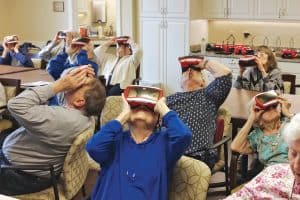
First-person shooter games. Military training exercises. Those are the applications most often associated with the words “virtual reality” (VR). But as new library offerings at North Carolina State University (NCSU) in Raleigh demonstrate, VR represents an amazing, state-of-the-art resource that can enhance just about any discipline, from cartography to psychology, architecture to English.
“The dynamic idea whose time has come today is the quest for freedom and human dignity,” said Martin Luther King Jr., to the eager crowd at White Rock Baptist Church, in Durham, North Carolina. It was February 16, 1960—just a couple of weeks after the famous Woolworth’s lunch counter sit-ins—and the civil rights leader was there to urge his supporters to further nonviolent action: “As we sit down quietly to request a cup of coffee, let us not forget to drink from that invisible cup of love, which can change a segregationist into an integrationist.”
No recordings were made of King’s stirring talk, and the church was demolished later that decade. But thanks to the robust and growing virtual reality resources at NCSU’s libraries (and some help from a voice actor), visitors will soon be able to step into an immersive digital re-creation of that day and experience the event just as actual audience members did 57 years ago.
The Virtual MLK Project, led by professor Victoria Gallagher of the university’s Department of Communications, is only one illustration of what can happen when VR technology is made available to all departments, faculty, and students alike.
“VR is one of those areas that has rich uses in disciplines like psychology and education, but it also has very technical pieces that fit more closely with computer science or design,” says David Woodbury, head of learning spaces and services at NCSU Libraries (which comprise the James B. Hunt Jr. Library and the D. H. Hill Library). “The library is a nice intersection of these disciplines, sort of a DMZ, a neutral area for people to come together and learn how new immersive technology might fit their field, how different disciplines can work together to solve a problem. It continues our tradition of democratizing access to technology, like we do with databases and books.”
In 2014, the libraries began lending the Oculus Rift VR headset. Since then they’ve added the other major consumer VR platform, the HTC Vive; 360-degree cameras and camcorders that capture views in every direction simultaneously; the Leap Motion Controller, which converts users’ hand motions into 3D output so they can interact with digital content; the Microsoft HoloLens, which allows users to place holograms in their physical environments; and other equipment.
Depending on the item, it may be checked out for hours or days, or used onsite in Hunt Library’s VR Usability Lab or Hill Library’s VR Studio. “We found very quickly that one of the things that our campus needs is a space that’s dedicated for VR, because of the complications of needing fast computers, needing to be able to move around within a set area, needing expert help close by to troubleshoot,” Woodbury says.
The VR Usability Lab lets users reserve a single room and use of the HTC Vive for two hours, perhaps to immerse themselves in a VR version of Google Earth. “Say you’re studying civil engineering. You can fly across a city to see how highways are laid out,” says Pete Schreiner, a NCSU Libraries Fellow who has driven much of the libraries’ VR efforts. “Or we have a lot of computer science students here who design games. To be able to play a dozen games in VR and see how the designers handled movement in them—that can mean a lot when you’re designing your own game.”
Meanwhile, the VR Studio offers six workstations, each with a high-powered computer and video card; three more workstations will be added soon. “We want to be able to have small classes in there, with everyone being able to use the same software for development,” Schreiner says.
A major user of the VR offerings is the university’s distance education group. “The challenge with distance education is reaching people,” says Woodbury. “Well, 360-degree video creates empathy with what you’re seeing in a way that’s different from regular video. They’re creating more guided content to give you a better sense of what it’s like to be in a clam boat, or at a controlled burn in a forest. They even put a 360-degree camera at a bug’s-eye level, which I think was horrifying to everyone.” VR is also well suited for food science orientation and safety training, as well as for training in potentially discomfiting situations such as public speaking.
To libraries that would like to begin offering VR tools but find themselves a bit intimidated by the prospect, “you don’t need a lot to get started,” says Jill Sexton, head of information technology. “It really depends on getting these VR headsets and a couple of computers that are powerful enough to power the headsets. You don’t need to have a lot of infrastructure in place. It’s more about building partnerships and making these consumer technologies accessible to students, and providing resources and time for your staff to get up to speed.”
But what about breakage or loss of these expensive items? That hasn’t been a problem, Woodbury says: “Students and faculty appreciate this so much that they take really good care of the things we loan to them.”


